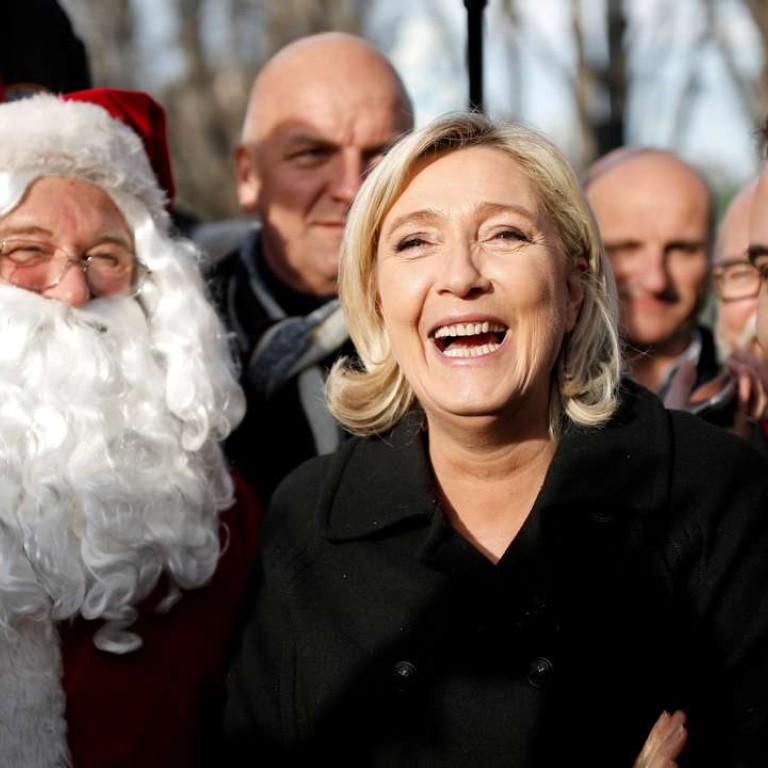
‘Le Pen risk’ takes centre stage as election fever grips Europe
Investors in Europe wait anxiously for the results of a series of elections in leading countries as populist parties grow in popularity
Will European politics produce its own “Trumpian surprise” this year?
This is the question on the lips of many investment strategists and market commentators as election fever grips Europe’s vulnerable single currency area, with crucial presidential and parliamentary ballots in at least three of the five largest economies in the euro zone.
The unexpected decision by Britain to vote to leave the European Union and the upset victory of Donald Trump in the United States presidential election have emboldened populist and nationalist parties across Europe, doing wonders for their transformation from extremist groups to mainstream parties.
In the Netherlands – the euro zone’s fifth-largest economy which holds a crucial parliamentary election on March 15 – the Party for Freedom (PVV), an anti-EU and anti-immigration party led by the blond-haired anti-Islam politician Geert Wilders, is already the most popular party according to several opinion polls.
The PVV is likely to win the biggest number of seats in parliament and, quite possibly, enter government by forming a coalition with premier Mark Rutte’s centre-right People’s Party for Freedom and Democracy (VVD).
Yet the market reaction to such a scenario would be relatively muted given international investors’ negligible sensitivity to Dutch political developments. The Netherlands is part of the “core” - the most creditworthy group of countries - of the eurozone, with the yield on Dutch 10-year bonds currently standing at a mere 0.3 per cent, only 15 basis points above its German equivalent.
The presidential election in France, on the other hand, with the first round on April 25 and the run-off on May 7, is much more of a concern to investors.

The eurozone’s second-largest economy and its most liquid government debt market (nearly 60 per cent of French bonds are held by foreigners, with Asian investors, particularly Japanese buyers, increasing their holdings over the past several years), France is the focal point of market anxiety about European political risk this year.
Marine Le Pen, the popular leader of the far-right National Front (FN), has the best chance of achieving a Trump-like upset in France’s presidential election.
Make no mistake, European political risk this year is, in many ways, “Le Pen risk”.
A staunch nationalist who wants to take France out of the EU and has successfully tapped into voter anger over immigration and near-stagnant economic growth, Le Pen is almost certain to make it to the second round of the country’s presidential election.
“It is not only about seeing the coming to power of parties wishing to put an end to budget austerity, but of seeing new leaders that are hostile to globalisation and European Monetary Union”, notes Amundi, a large asset manager, in its forecast for the year.
A Le Pen victory – which, although unlikely, represents the biggest “tail risk” in European politics this year – would be a huge blow to the eurozone. Investors would once again start to price in the risk of a break-up of the single currency area before a referendum on France’s membership of the bloc.

A Brexit would not necessarily lead to the dissolution of the eurozone – since Britain’s decision to vote to leave the EU, the bond yields of southern European countries have remained at exceptionally low levels, suggesting most investors still believe the bloc will remain intact – but a “Frexit” undoubtedly would. France is not only a founding member of the EU (Britain was never even part of the single currency area), it has been, along with Germany, the motor of European integration over the past 50 years or so.
That Germany itself is holding a crucial parliamentary election in September raises the stakes further.
Chancellor Angela Merkel’s controversial open-door refugee policy has triggered a fierce domestic backlash, undermining her authority in Germany and abroad.
The rise of the nationalist Alternative for Germany (AfD), which performed strongly in a string of regional elections last year and is expected to become the first far-right party to enter Germany’s parliament since 1945, has drained votes away from both Merkel’s Christian Democrats (CDU) and her Social Democrat (SPD) coalition partner.
Add in a possible snap election in Italy, the eurozone’s third-largest economy, next year, in which the populist Five Star Movement would almost certainly perform strongly, and there are plenty of political risks in Europe to keep investors on edge.
Still, the speed at which markets recovered following the Brexit vote – and, in the case of the equity markets, even surged after Trump’s victory – shows that international investors’ ability to brush off or downplay political risks should not be underestimated.
A Le Pen presidency in France, however, with all its dire implications for the eurozone, would be very difficult for markets to play down.
Nicholas Spiro is partner of Lauressa Advisory

